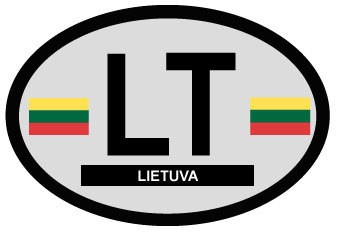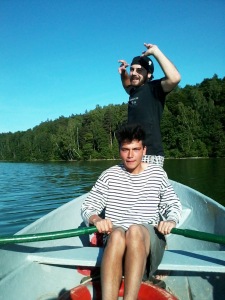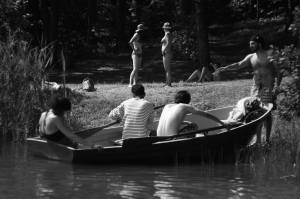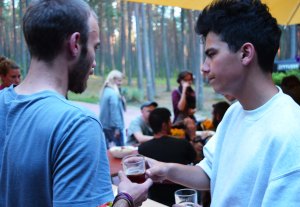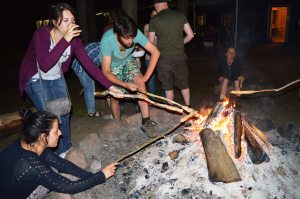Here is the video I made to promote the project Social Taxi for which I am volunteering in Lithuania.
Category Archives: EVS
Video: the Sandra’s experience in a wheelchair
We started this project one month ago with Sandra, my Spanish colleague, now the video is online on youtube and facebook.
The idea was that a valid person moves around in Lithuania in a wheelchair, to report in a video the difficulties that disabled people can find on their way. We took one wheelchair, gloves (very important!), 2 cameras and a microphone, and we went to discover Lithuania, by trains, buses, sidewalks and pedestrian streets.
A 26-minute video documentary shows how is the accessibility in the three largest Lithuanian cities: Kaunas, Klaipeda and Vilnius.
Subtitles here ![]()
Through this adventure, we saw some problems in the public area, the problems that we do not see usually with our eyes of able-bodied people. We needed to see it from a wheelchair to understand how the cities are full of obstacles: broken elevators, special elevators that nobody knows how to use, pavements with stairs, cobbled pedestrian roads, lack of ramp to enter in a restaurant or a coffee place, or non-adapted toilets. Fortunately, all the time, we could see the generosity of people around us. In this way, we saw as well how disabled people are vulnerable and dependent on others.
A rich learning experience for us, wich had showed us how the infrastructure could be improved in the public areas, to make cities accessible to all.
Social Taxi and the National Institute for Social Integration
Seven months has passed since that I am in Lithuania, seven months that I volunteer for Social Taxi and for the National Institute for Social Integration, and as I did not speak about it in this blog yet. Presentation:

It is a taxi adapted for disabled people. This car has a ramp and allows wheelchair users to travel anywhere in the city and around, ordering their trip on the website of Social Taxi. The project is working in four Lithuanian cities: Vilnius, Kaunas, Klaipėda and Zarasai.
Also, I need to introduce the team of the organization. On this picture, the team is almost complete, just before that the first volunteers go back to their country. The three Spanish volunteers have already spent their nine months of EVS and leave Lithunia in this month of November …
After that, we will be only 2 volunteers: me (until January) and Oriana (until February).
Mid-term training
During the EVS, two trainings are organized. The arrival training and the midterm training. So we are 20 volunteers from all over Lithuania and we meet to talk about our experience in EVS. We are Spanish, Italian, French, Romanian, Portuguese, Greek and Armenian. For this training, we spend few days in a natural park, near to the longest lake of Lithuania (22 km).
The schedule is about: first, some “bla-bla”, and then a boat trip on the lake, midnight baths, sauna, songs around the fire, with a battalion of mosquitoes ready to eat the few humans came to enjoy their lake!
For the last dinner, everyone is cooking a specialty of his country: Andalusian Salmolejo, tortilla de patatas, Italian tiramisu and bruschetta, and … French Gratin-Dauphinois!
- Jordi (Catalan) and Clément (French)
- Jordi (Catalan) and Alexandre (French)
- The “moussaillons” are ready
- Waiting for the wave (waiting in vain)
- Pontoon on the Asveja Lake
- Yaiza (Spanish) cooking Salmorejo, an Andalusian cold soup
- Italian bruschetta
- Marco (Italian) and Alexandre (French)
- our houses
- bread in the barbecue
- bread in the barbecue
- Rocio (Spanish), Alice (Italian) and Clément (French)
Interview of Oriana, my Italian flatemate
She speaks about her EVS and her experience in Vilnius :
How to improve your english during EVS

Some tips (to myself) to improve my English during my EVS.
1. Stop to invent words! .. It is not because English and French are sometimes similar that you can take a smart face and an English accent (impossible accent) to say “supposably”. No, “supposably” is not an English word …
2. Improve your accent! You live and speak all day long with Spanish, Italian and Lithuanian people, so, be CARRRREFUL with your accent, wich is already not English at all, but not even French anymore …
3. Extend your vocabulary: When you desperately looking for an English word that you do not know the solution is not: to simply say it in French! Of course, you have 9 chances out of 10 that your Spanish and Italian flatemates understand you perfectly, because this is probably the same word in their language, but that does not help you to know the word in English.
4. Knowing your interlocutor: practical example – if you arrive in the train station in Vilnius speaking in English to the lady who sell the tickets and who is actually Russian, you will quickly understand that speaking in English with her it is like to speak Russian in America … Her reaction will like:
 < “Я не понимаю…”
< “Я не понимаю…”
This week end in Kaunas, it was “Get Cultureful”
This weekend in Kaunas (the second biggest city of Lithuania), we had to wear white shirts!
A European Day was organized, bringing together many European volunteers for a battle of colors!
